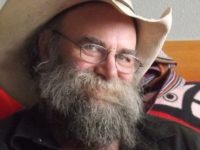Finn Wilcox is the author of the new book Too Late to Turn Back Now: Prose & Poems 1980-2016. His other books include Working the Woods, Working the Sea. He spent 25 years working with Olympic Reforestation, a forest workers co-op, and he lives in Port Townsend, Washington.
Q:
In an article on ptleader.com,
Jenny Westdal writes, “Although Finn Wilcox has traveled, his writings are
rooted in place. That place is the Pacific Northwest. This is the Northwest
where work is found in the woods, and life is hard, simple and engulfed in
beauty. This place runs deep, down to the core of a person’s identity.” What do
you think of that assessment?
A:
I’d say that assessment is spot on. The Pacific Northwest has always been the
baseline of what I am. Aside from a couple years in Utah and short stints in
other western states, the Northwest is where I’ve lived all my life.
Mentors
and heroes, artists and poets that I have the highest regard for, all spring
from here. To my way of thinking, no other artists compare to Morris Graves,
Mark Tobey, Guy Anderson, Philip McCracken, Kenneth Callahan and all the other
great lions of the early Northwest art scene. Same holds true for poets I
admire most: Robert Sund, Tim McNulty, Mike O’Connor, Clem Starck, Jim Dodge,
Gary Snyder, Michael Daley and many others.
There
is a sensibility (although hard to put your finger on) that ties all these
artists and writers together in a loose but solid Northwest school. Half those
poets I just mentioned I worked in the woods with all through the 1970s and ‘80s.
If I had a dollar for every night we sat around a blazing wood stove in a tent
drying out socks and gloves after a long wet day in the woods, I’d be a wealthy
man. As Robert Sund said, “Poets with mud on their boots.”
Q:
How did this new collection of your work from 1980-2016 come about?
A:
I was giving some thought to reprinting my freight train book, Here Among the Sacrificed. My old friend and editor from Empty Bowl press got hold of me and
suggested we do a book that also included my chapbooks and new work. Something
along the lines of a collected works. Sounded good to me. And I must say, I am
delighted to see much of my work, such as it is, in this handsome volume.
Q:
How was the book's title—also the title of one of the poems in the
collection—chosen, and what does it signify for you?
A:
That's an interesting question. I believe all artists at some point go through
something akin to metaphysical ambivalence. That is, you sit down, maybe with a
bottle of Jack Daniels, and have a long talk with yourself about why the fuck
you think anyone cares about what you have to say. It's a head-scratcher and
something real that you need to come to terms with.
I
decided at an early age that I liked beans and rice enough to commit to
becoming a poet. That was many years ago. Now, at 65, the realization that it is
indeed too late to turn back now, not only doesn't scare me, it delights and
makes me deeply happy. I suppose that's one reason for the book's title.
Another
is from an encounter I had one time in our local bar with an old painter
friend of mine. He was extremely drunk and surly one night and bellowed down
the bar at me, "It's too late to turn back now, until you poets realize
that, you'll remain cowards not artists."
I
still don't understand exactly what he meant by it, but it has stuck with me
for 25 or 30 years now. He is long dead and it seemed a good way to give him
three bows.
Q:
Would you say there are certain themes running through the entire collection?
A:
Not really. A measure of my life so far I suppose.
Q:
What are you working on now?
A:
Frankly, I've been so busy doing readings and helping pimp this book that I
haven't had much time to write. My intention is to work on short prose and
poems about my time working in the woods. There is much to be mined from those
times that I haven't even begun to explore.
The
irony is that along with my co-editor, Jerry Gorsline, we put together an
anthology of Northwest writings called, Working the Woods, Working the Sea,
back in 1986. We did a new and expanded edition in 2008 that took up months of
our time. I was so busy dealing with other people's writing about working the
woods that I didn't have any time to work on my own stuff concerning the
subject. I'm going to remedy that starting this winter.
Q:
Anything else we should know?
A:
I was milk monitor twice in kindergarten.
--Interview with Deborah Kalb




No comments:
Post a Comment